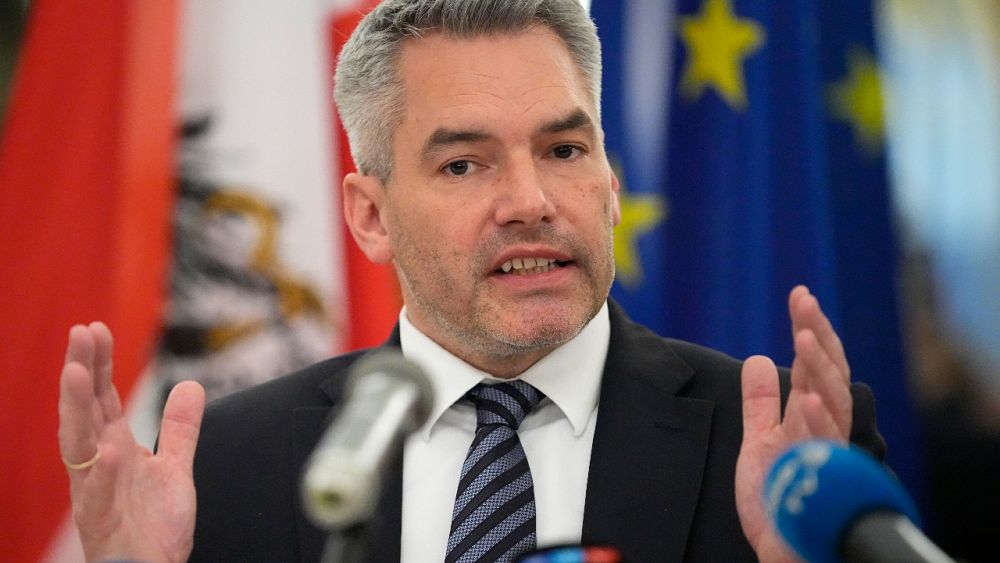
Austria has struggled to define its official state neutrality since the full-scale invasion of Ukraine. At the moment, it continues to import Russian gas at maximum capacity, a key source of profit for Moscow.
Not so in Austria.
The Central European country increased its imports by up to 80 per cent in January, according to the Climate Ministry.
Before the embargo, which was considered a way of forcing Russia to withdraw from Ukraine or negotiate with the EU, Moscow earned upwards of 600 million euros per day in profits from exporting gas to Europe.
While there were dips during last summer – plus an all-time low of 17 percent was registered in October – Austria has now returned to pre-invasion import levels.
Due to a combination of historical and political factors, the government has struggled to define its position regarding Ukraine within the united EU front.
After World War II, when Austria was formally absorbed by Nazi Germany in a move known as the “Anschluss”, allied countries including the US, UK, France and the Soviet Union divided Austria into occupied zones.
In 1955, when an end to the occupation was negotiated, Austria signed a treaty of permanent neutrality which prevents it from joining any military pact or allowing foreign militaries to be stationed on its territory.
Political neutrality has since been interpreted as part of the pact by various politicians and analysts, leading to repeated debates in the Austrian parliament.
The country only joined the EU when Sweden and Finland, which declared neutrality during the Cold War, joined as well.
Despite this, both Sweden and Finland have expressed interest in joining NATO since the Russian invasion, with the latter formalising its entry earlier this year.
Austria is not part of the US-led military alliance, though has close ties to it.
Once again, Russia delivers full gas volumes to Austria
The Austrian regulatory authority for the electricity and gas industry justifies the increase by saying that imports from Germany and Italy declined in November and December, while inflows from Russia remain constantly high.
Gazprom sharply curtailed gas exports to Europe this summer. Most recently, however, 100 per cent of the ordered quantity had been delivered to Austria again, as the head of the Austrian energy company (OMV) Alfred Stern announced at the beginning of February.
Germany currently imports no Russian gas.
In 2018, Vladimir Putin himself appeared in Vienna to take part in the signing of long-term gas supply contracts between Gazprom and OMV together with then-Chancellor Sebastian Kurz.
At the time, Austria committed itself to Russian gas until 2040 and doubled its supply volumes. Putin spoke of “energy security for the whole continent through good cooperation”. The details of the contract remain secret. What is known, however, is that OMV must pay, whether Russian gas is taken or not.
Karl Nehammer, acting chancellor of Austria, welcomed the fact that the country had filled its gas storage reserves at the end of last year.
Recently, he also resisted calls for action against OMV. “If the Russians continue to deliver, then I cannot forbid OMV to fulfill its contractual obligations,” Nehammer said during a TV appearance on the country’s public broadcaster.
Lackluster progress with renewables
Meanwhile, Austria is making little headway in developing alternatives to gas-fired power generation, despite energy minister Leonore Gewessler pledging to make the country more independent with renewables.
“We have a lot more to do to get to the root of the problem,” she said last week. “Real independence,” after all, will only exist “when we free ourselves from dependence on Russian gas.”
In light of this, she again urged citizens to save energy. “The more gas we save, the fuller the storage reserves will remain for next winter.”
Austrians are failing to reduce their gas consumption compared to other European countries, local outlets report. The country’s renewable energy is mainly derived from hydropower, but a harsh drought has reduced energy yields.
Austria has imported 7 billion euros worth of gas from Russia since Moscow’s invasion of Ukraine began last February, according to the ministry.
More money is currently transferred from Vienna to Russia for gas than the total amount of aid spent on Ukraine by Austria since the start of the war.